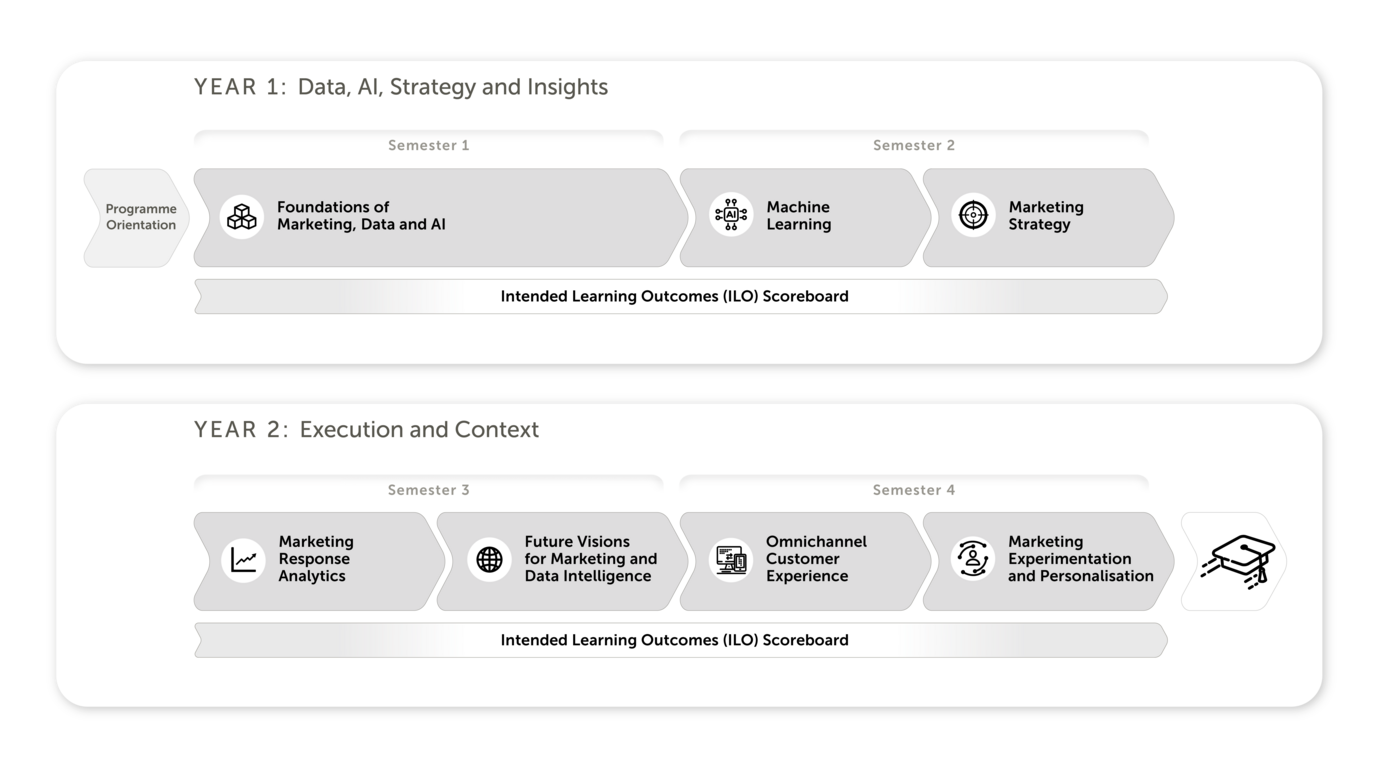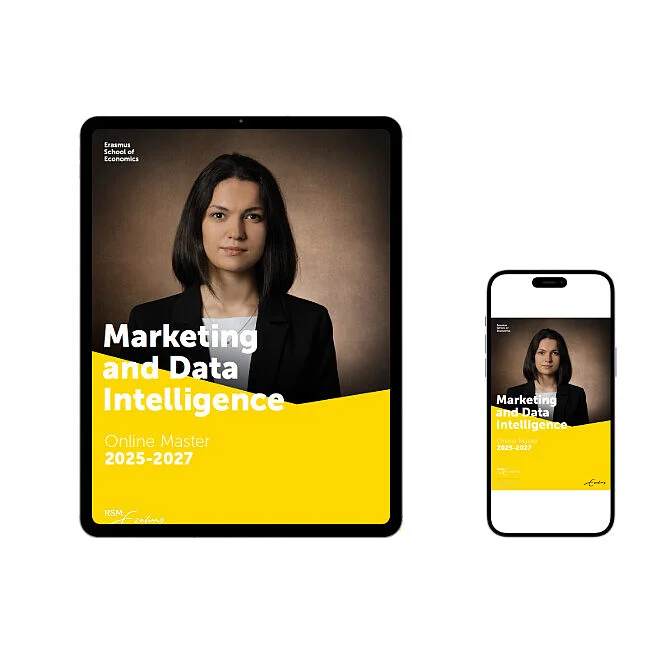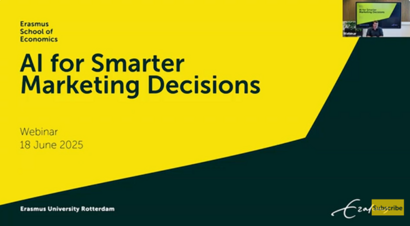The Online Master in Marketing and Data Intelligence is taught by the Erasmus School of Economics. It's delivered over four structured and dynamic semesters across two years, offered in a flexible part‑time format. The programme equips you with the analytical and technical capabilities required to address real‑world marketing challenges through data‑driven insights.
Throughout the curriculum, you will work directly with advanced data science tools and methodologies, gaining practical hands-on experience in developing accurate and impactful solutions.
In addition to technical proficiency, the programme cultivates critical and reflective thinking. You will learn to translate complex analyses into strategic, well‑founded recommendations that meet the needs of diverse stakeholders and support informed decision‑making across the marketing landscape.
Year 1
Build a strong foundation in insights, data, AI, and marketing strategy. You’ll gain:
- A clear understanding of how consumers and companies behave
- Practical skills in machine learning and AI for marketing data
- The ability to turn insights into actions that really make an impact
A practical refresher on the foundations of marketing, data and AI.
Explore essential data science tools like R programming, visualisation, and machine learning applied to real-world marketing cases. You'll revisit core marketing concepts while learning how to turn data into actionable insights using modern, AI-driven approaches.
At the end of this course, you will be able to:
- Understand the data science process (Cross-Industry Standard Process for Data Mining)
- Analyse marketing problems from a practical perspective
- Apply basic data science methods to marketing problems
- Obtain marketing-relevant insights using data science methods
Build on your foundational knowledge of data science, introducing advanced machine learning techniques such as random forests, boosting, and neural networks to solve complex business problems. You'll also explore explainable AI, learning how to translate powerful but opaque models into clear, actionable insights.
Through hands-on cases in R, you’ll apply these methods to real-world challenges like price prediction, customer behaviour, and sales conversion, developing both technical and strategic decision-making skills.
At the end of this course, you will be able to:
- Select the most suitable techniques to solve real-world problems by evaluating learning algorithms and performing model selection
- Apply explainable AI methods to interpret the model results
- Create policy recommendations for organisations by transforming results produced by machine learning algorithms into insights
Explore how data science is transforming strategic marketing. You’ll learn how to extract actionable customer and market insights, apply advanced segmentation and targeting techniques, and make smarter decisions across the marketing mix—product, price, place, and promotion.
Using real-world cases from companies like Uber, Google, and Amazon, you'll see how modern tools and AI-driven strategies are reshaping marketing at every level from customer profiling to omnichannel delivery and dynamic pricing.
At the end of this course, you will be able to
- Analyse customer and market data using advanced marketing analytics to derive actionable insights
- Employ segmentation, targeting, and positioning strategies using advanced marketing frameworks
- Develop innovative data-driven marketing mix strategies to address real-world business challenges
- Synthesize sustainable and ethical marketing strategies by integrating business objectives with societal and environmental considerations
Year 2
Take a deep dive into putting marketing strategy into action. You’ll learn how to make real decisions that drive results.
One course helps you think ahead by exploring how society, organisations, and future uncertainties shape strategy, so you’ll be ready to lead confidently, even in a fast-changing world.
Explore how firms reach and engage end users through modern marketing and distribution channels. You'll learn to design and manage omnichannel strategies that enhance customer experience across the journey from channel selection to personalisation.
Key topics include selecting the right channels, managing touchpoints, working with third-party distributors, and using data tools like recommendation systems and market basket analysis to improve channel performance. Real-world cases and hands-on analysis will prepare you to lead go-to-market strategies in today’s digital landscape.
At the end of this course, you will be able to
- Understand the concepts, theory, and key issues for managing omnichannel customer experiences
- Solve business problems in omnichannel marketing and customer experience management
- Appraise the go-to-market systems of companies or organisations
- Demonstrate analytical and business communication skills, oral and written
This course focuses on causal thinking in data-driven marketing. While machine learning often identifies patterns, marketers need to understand why outcomes occur to make effective decisions.
You'll learn to distinguish correlation from causation, detect biases like endogeneity, and apply methods such as A/B testing, holdout samples, and statistical techniques to uncover true causal effects. The course emphasizes how assumptions about customer and firm behaviour impact data interpretation ensuring your marketing actions are based on sound evidence, not just predictions.
At the end of this course, you will be able to
- Understand the differences between correlation, causation, and reverse causation
- Design a data collection process that ensures a causal analysis is feasible
- Appraise the assumptions needed to ensure proper causal inference
- Interpret estimates of causal effects, given a set of assumptions.
This course equips you to measure customer responses to marketing actions, your own and competitors', using historical performance and campaign data. You'll learn how to assess the effectiveness of marketing mix elements, including both hard metrics (sales, market share) and soft metrics (brand awareness, equity).
Key topics include attribution modelling for multi-channel campaigns, understanding dynamic effects like stockpiling, and using time series and machine learning methods to model customer and market responses over time. The insights gained help optimize marketing actions and budgets for maximum impact on goals like sales, profitability, and market share.
At the end of this course, you will be able to
- Apply machine learning methods to measure responses to marketing actions
- Evaluate data-driven insights into competitor responses, market structure and market heterogeneity
- Evaluate different marketing mix decisions using data
In an era of rapid change, this course prepares you to lead with foresight, innovation, and responsibility. You'll learn how to apply strategic foresight to anticipate and shape future scenarios, develop innovative products and business models using emerging technologies like AI, AR, and VR, and navigate ethical, legal, and privacy challenges in data-driven marketing.
By combining future-oriented thinking with practical tools, you’ll be equipped to drive innovation and make informed, responsible decisions in the age of AI.
At the end of this course, you will be able to
- Use a step-by-step methodology to achieve strategic foresight
- Understand how consumers respond to emerging technologies
- Develop innovative ideas based on the analysis of the future
- Evaluate the ethical, legal, and privacy challenges that arise from the use of data and in AI in marketing.
Our carefully designed blend of learning activities and resources provides a structure with ample flexibility such that you can plan for and engage with the learning materials at a time and place most convenient for you.
Hands-on approach to learning
First and foremost, the programme is designed for active learning, so you gain experience, not just knowledge. By working on group and individual assignments, including case studies, data analyses, and essays, you will apply new concepts directly, turning theory into practical skills. This hands-on approach deepens your understanding, strengthens your problem-solving abilities, and equips you to confidently tackle real-world challenges.
Independent study
Study with more flexibility than a scheduled programme on campus. For example, working on online materials such as knowledge clips, guided readings, discussion forums, and online workbooks can be fitted around your other obligations.
Live sessions
Take part in weekly interactive online sessions with professors and the learning experience team, where students discuss key course topics, ask questions, and learn collaboratively, mirroring the on‑campus experience.
Assessment
Assessment of individual and group learning is done through various formats: essays, online discussions, reports, quizzes, presentations, and peer assessments. These different types of assessments provide everyone with the opportunity to successfully demonstrate their competencies in ways that fit their preferences.
Intended Learning Outcomes (ILOs)
During the Online MSc Marketing and Data Intelligence you do not have to write a thesis.
Instead, throughout the master programme, you work towards mastering a set out Intended Learning Outcomes (ILOs). As you progress, you build an ILO scoreboard that shows your achievements for each ILO at the programme level. To graduate, you must meet all the ILOs.
As ILOs represent the final learning goals, more weight is given to results from modules in the second year of the programme.
The digital ILO scoreboard:
- Provides learners with feedback during their studies, complementing the learner’s self-reflection assignments.
- Enables learners to monitor their progress through both their grades for each of the modules and the reported degree of mastery of each ILO.
- Helps to track whether learners are meeting all the ILOs throughout the programme, based on the course assessments.
Intended Learning Outcomes (ILOs):
ILO 1.1: Learners will master the academic and practical foundations of data and AI in marketing
ILO 1.2: Learners will understand the business relevance of evidence-based marketing solutions, based on concepts and theories from academic research
ILO 1.3: Learners will comprehend the current academic, societal and organizational debates relevant to the use of data and AI in marketing
ILO 2.1: Learners will be able to evaluate research findings from data analyses to draw reasoned conclusions and recommendations
ILO 2.2: Learners will be able to account for societal and organizational considerations in their research design
ILO 3.1: Learners will be able to use critical thinking and reflection to obtain creative yet rigorous insights for marketing in the age of data and AI
ILO 3.2: Learners will be able to contribute to the societal and organizational debates relevant to marketing in the age of data and AI
Online MSc Marketing and Data Intelligence is taught by experienced faculty members from the Erasmus School of Economics who are experts in their fields and active researchers. Get to know a few of them and what you can learn with them.
About Erasmus School of Economics: home to Europe’s top-ranked marketing science group, known for its academic excellence and strong industry connections. You will benefit from research-driven teaching, hands-on learning with real companies, and a global alumni network.
- A world-class education provider in business and economics. Learn more.
- Top 50 Economics schools globally - QS Ranking. Learn more.
- A strong focus on current and future real-world questions. Learn more.
The faculty from Erasmus School of Economics
Dr Pieter Schoonees
Academic director
Course: Foundations of Marketing, Data and AI

Prof Dr Bas Donkers
Programme coordinator

Dr Anastasija Tetereva
Assistant professor
Course: Machine Learning

Dr Kathrin Gruber
Assistant professor | Econometrics
Course: Machine Learning

Dr Andreas Bayerl
Assistant professor | Marketing
Course: Marketing Strategy

Prof Dr Martijn de Jong
Full professor | Marketing
Course: Future Visions for Marketing and Data Intelligence

Prof Dr Stefan Stremerch
Full professor | Marketing
Course: Future Visions for Marketing and Data Intelligence

Dr Eyo Herstad
Assistant professor | Econometrics
Course: Marketing Experimentation and Personalisation

Dr Sean Bruggemann
Assistant professor | Marketing
Course: Omnichannel Customer Experience

Bruno Tindemans
Visiting Professor

There's increasing new demand for data skilled professionals, due to the adoption of artificial intelligence and the growing use of data. This trend is evident across various sectors and is reshaping workforce dynamics.
As a learner in the Online Master Marketing and Data Intelligence you can immediately apply the knowledge and skills to a broad range of roles. These are some example of the job titles this master positions you for, they are roles that are higher-impact and often higher-growth than traditional marketing jobs:
- (senior) marketing data scientist
- (senior) marketer or digital marketer
- data translator (working at the intersection of marketing and data science)
- analytics consultant
- business intelligence specialist
- AI/ML marketing lead
- customer insight manager
- competitive intelligence lead
- attribution/media mix modeling specialist
- marketing data science lead
- product owner data analytics / AI
There are many other roles, beyond the ones we list above, in which a mindset focused on data-driven insights and decision making are valuable, for example:
- HR / Talent Acquisition
- project manager
- IT advisor
- software engineer
- computer engineer
- product management
When you graduate from this master programme, you will be equipped with new knowledge, the latest skills, tools and a fresh perspective.
Tools, languages, techniques:
- Python (programming language)
- R (programming language)
- Data visualisation
- Machine learning
Knowledge
- Hold substantive knowledge on company and consumer behaviour.
- Know and use the methodological aspects of data and AI.
- Carry a critical understanding of the strategies and responsibilities that organisations face in relation to how data and AI are used to support marketing decisions.
Skills
- Be able to effectively use data and AI support marketing decision making.
- Be competent in getting actionable insights from data-driven analyses that are grounded in theory.
- Work collaboratively to tackle the challenges and responsibilities that come with access to data and AI.
Reasoning
- Have a solution-oriented approach to using data and AI to improve marketing in their own organisations.
- Participate in societal and organisational debates relevant to the use of data and AI for marketing or start new enterprises to create positive change.














